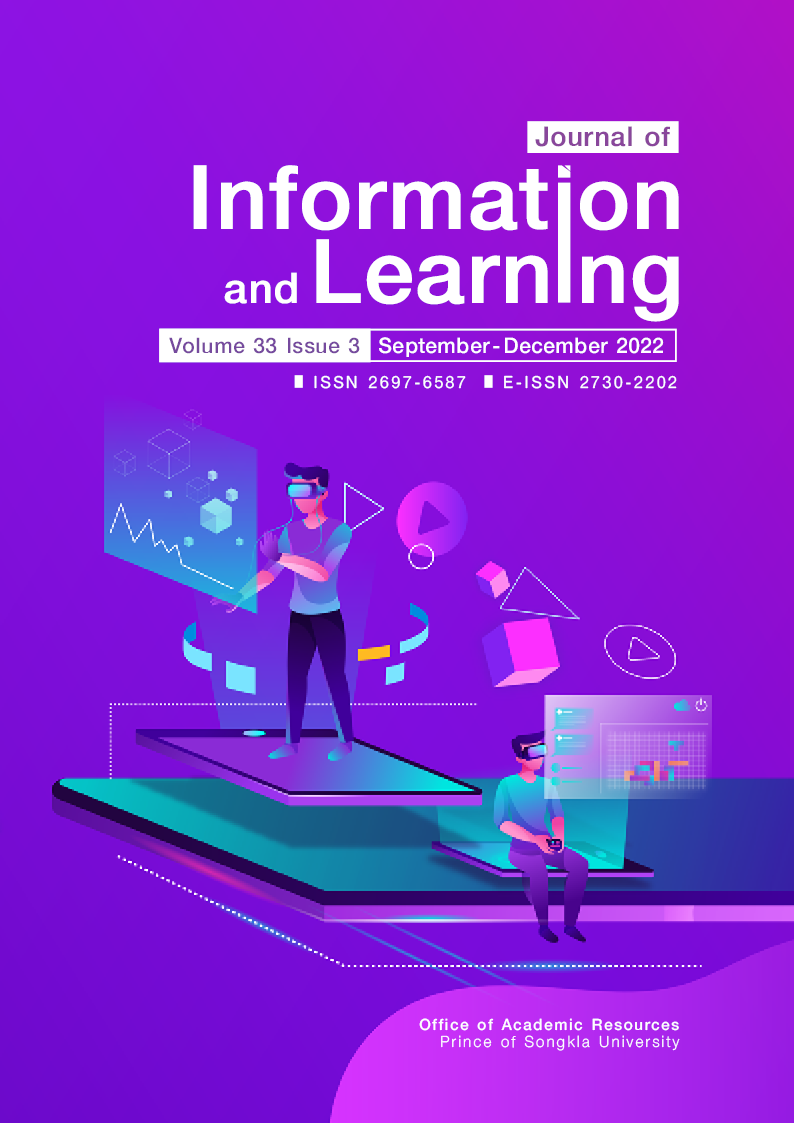Grade 11 Students' Online Learning Behavior and Satisfaction towards Learning Physics during the COVID-19 at a High School in Narathiwat
Main Article Content
Abstract
The COVID-19 pandemic situation has changed education around the world. Instructional systems have been modified to be in an online format. The purpose of this research was to investigate high school students’ online physics studying behavior and their satisfaction with these studies during the COVID-19 pandemic. The sample group consisted of 103 students in Grade 11 across four physics classrooms at a high school in the first semester of academic year 2021. The data were collected using an online questionnaire and semi-structured interviews. The statistics used included percentage, frequency, mean, and standard deviation. The results of the research revealed that overall, online learning behaviors were at a moderate level which the highest average mean was the teaching time that the teacher allowed students to have opportunity to ask some questions and shared their opinions (=3.40). It was also found that students' satisfaction with online learning was overall at a moderate level. The aspect with the highest average satisfaction was technology and communication (
=3.27), followed by time and place (
=3.16), and the aspect with the least satisfaction was the learners themselves (
=3.00). Students of different ages did not differ in their learning satisfaction. In addition, interviews with 14 students indicated that issues affecting online learning behaviors included ambient noise while studying online and lack of dedicated physical learning spaces. Overall, students preferred onsite learning to online learning.
Article Details

This work is licensed under a Creative Commons Attribution-NonCommercial-NoDerivatives 4.0 International License.
The Journal of Information and Learning is operated by the Office of Academic Resources, Prince of Songkla University. All articles published in the journal are protected by Thailand copyright law. This copyright covers the exclusive rights to share, reproduce and distribute the article, including in electronic forms, reprints, translations, photographic reproductions, or similar. Authors own copyrights in the works they have created as well as the Office of Academic Resources. The Journal reserves the right to edit the language of papers accepted for publication for clarity and correctness, as well as to make formal changes to ensure compliance with the journal's guidelines. All authors must take public responsibility for the content of their paper.
References
Inthasorn, S. (2020). COVID-19 and online teaching case study: Web programming course. Journal of Management Science Review, 22(2), 203-214. https://so03.tci-thaijo.org/index.php/msaru/article/view/244722/167805
Maneewongse, N. (2021). Students behaviors and factors achieving online teaching with Line application during COVID- 19. Journal of Educational Studies, 15(1), 161-173.
Panmuang, M. (1988). Components affecting teaching efficiency of primary school teachers under Phitsanulok Provincial Primary Education Office [Master's thesis, Naresuan University]. Thai Library Integrated System-ThaiLIS. http://uc.thailis.or.th/Catalog/BibItem.aspx?BibID=b00531935.
Pluemsamran, B., Sikkhabandit, S., & Theerawitthayalert, P. (2014). The teacher’s competencies development model for information technology learning management to the Asian community. Journal of Faculty of Physical Education, 17(1), 15-26. https://doi.nrct.go.th/ListDoi/listDetail?Resolve_DOI=10.14458/NBU.the.2014.7
Punkhetnakorn, T., Nak-in, N., & Yongsoi, P. (2021). Design and development of online learning media o meet the learning behaviors of students in the digital age. Journal of Legal Entity Management and Local Innovation, 7(5), 327-335.
Somchok, A., & Suttiwan, W. (2021). A study of online learning management conditions of grade 6 students in Watdonmuang school. Journal of Modern Learning Development, 6(5), 194-208. https://so06.tci-thaijo.org/index.php/jomld/article/view/249925
Songkaew, N. (2015, April 09). Meaning of e-learning. ALL ABOUT KHEM. https://sites.google.com/site/khemromanov/khwam-hmay-khxng-e-learning
Thongthammachat, C. (1998). The relationship between school administrators’ use of power and the teaching efficiency of primary school teachers under the office of Yala provincial primary education [Master's thesis, Sukhothai Thammathirat Open University]. Thai Thesis Database. http://www.thaithesis.org/detail.php?id=58875
Tiyawong, J. (2021). The effects of students’ learning achievement and satisfaction through online instruction on Parallel Lines for Mathayomsuksa 2. Academic Journal of North Bangkok University, 10(2), 1-9. https://so01.tci-thaijo.org/index.php/NBU/article/view/252612/169307


